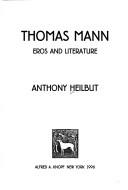Check nearby libraries
Buy this book

A groundbreaking biography of one of the century's most important writers. A portrait of Thomas Mann's Germany, his work, his life, his exile and arrival in America - a life of suffering and courage, of great achievement, a life beset by political hostility from the right and the left, and by the torments of sexual frustration.
We see Mann, the wunderkind, transforming the history of his family into Germany's first classic novel, Buddenbrooks...the competition between Thomas and his brother Heinrich, who became his greatest literary rival.
We see Mann in turn-of-the-century Munich, always the hyperobservant outsider. And we come to understand his immense loneliness, a loneliness interrupted briefly by an affair with a young violinist, Paul Ehrenberg ("that central experience of my heart"), that was later dramatized in Doctor Faustus.
We watch his unlikely courtship of the brilliant Katia Pringsheim, member of a wealthy assimilated Jewish family. We follow their life together during their fifty-year marriage and observe his complicated relations with his six children, particularly Klaus and Erika, who became the leading political and sexual radicals of their generation.
Anthony Heilbut defines Mann's place in literary historyhis relation to his literary ancestors, particularly Goethe and Nietzsche, as well as his contemporaries Gide and Kafka, and to the American writers Whitman and Melville. He provides new social and psychological insights into the interplay of Mann's life with such works as Death in Venice, The Magic Mountain, Joseph and His Brothers, and The Confessions of Felix Krull.
We watch Mann contend with the major intellectual and political crises of Europe after World War I as he evolves politically from arch defender of Germany to leading antifascist. We discover a link between his humanist politics and his dreams of sexual emancipation. We see Mann alternately enthralled and horrified by popular culture. We follow his increasing identification with the Jewish community, which included his most fervent admirers and harshest critics.
Anthony Heilbut considers Mann's experience of America, first as a devotee of Roosevelt, then as an outspoken opponent of McCarthyism who was widely condemned in the press and in Congress, and hounded by his enemies well into his late seventies.
Check nearby libraries
Buy this book

Previews available in: English
| Edition | Availability |
|---|---|
|
1
Thomas Mann
September 16, 1997, Random House Value Publishing
Hardcover
in English
0517193973 9780517193976
|
zzzz
|
|
2
Thomas Mann: eros and literature
1997, University of California Press
in English
0520209117 9780520209114
|
cccc
|
| 3 |
zzzz
|
|
4
Thomas Mann: eros and literature
1996, A.A. Knopf, Distributed by Random House
in English
- 1st ed.
039455633X 9780394556338
|
aaaa
|
| 5 |
cccc
|
Book Details
Edition Notes
Includes bibliographical references (p. [611]-618) and index.
Classifications
The Physical Object
ID Numbers
Source records
marc_openlibraries_sanfranciscopubliclibrary MARC recordInternet Archive item record
Library of Congress MARC record
marc_nuls MARC record
marc_columbia MARC record
Work Description
A groundbreaking biography of one of the century's most important writers. A portrait of Thomas Mann's Germany, his work, his life, his exile and arrival in America - a life of suffering and courage, of great achievement, a life beset by political hostility from the right and the left, and by the torments of sexual frustration.
We see Mann, the wunderkind, transforming the history of his family into Germany's first classic novel, Buddenbrooks, and the competition between Thomas and his brother Heinrich, who became his greatest literary rival. We see Mann in turn-of-the-century Munich, always the hyperobservant outsider. And we come to understand his immense loneliness, a loneliness interrupted briefly by an affair with a young violinist, Paul Ehrenberg ("that central experience of my heart"), that was later dramatized in Doctor Faustus.
We watch his unlikely courtship of the brilliant Katia Pringsheim, member of a wealthy assimilated Jewish family. We follow their life together during their fifty-year marriage and observe his complicated relations with his six children, particularly Klaus and Erika, who became the leading political and sexual radicals of their generation. Anthony Heilbut defines Mann's place in literary historyhis relation to his literary ancestors, particularly Goethe and Nietzsche, as well as his contemporaries Gide and Kafka, and to the American writers Whitman and Melville. He provides new social and psychological insights into the interplay of Mann's life with such works as Death in Venice, The Magic Mountain, Joseph and His Brothers, and The Confessions of Felix Krull.
We watch Mann contend with the major intellectual and political crises of Europe after World War Ias he evolves politically from arch defender of Germany to leading antifascist. We discover a link between his humanist politics and his dreams of sexual emancipation. We see Mann alternately enthralled and horrified by popular culture.
We follow his increasing identification with the Jewish community, which included his most fervent admirers and harshest critics. Anthony Heilbut considers Mann's experience of America, first as a devotee of Roosevelt, then as an outspoken opponent of McCarthyism who was widely condemned in the press and in Congress, and hounded by his enemies well into his late seventies.
Links outside Open Library
Community Reviews (0)
Feedback?| November 8, 2021 | Edited by Jenner | Edited without comment. |
| November 7, 2021 | Edited by Jenner | Edited without comment. |
| November 7, 2021 | Edited by Jenner | Merge works |
| August 20, 2021 | Edited by MARC Bot | import existing book |
| December 10, 2009 | Created by WorkBot | add works page |














